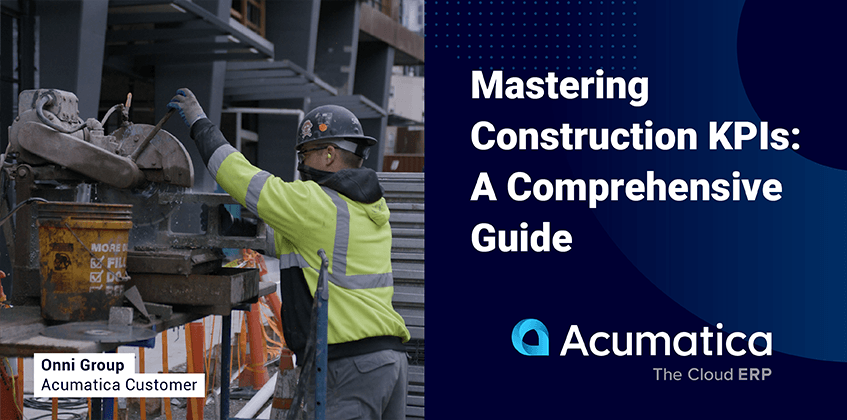
Construction KPIs and Metrics
As a construction professional operating in today’s marketplace, you’re contending with a number of challenges, such as escalating costs, frustrating labor shortages, and complex regulations—just to name a few.
Since these broader macroeconomic and policy issues are beyond your control, how can you directly ensure that your company remains competitive, profitable, and successful in the long term? Key performance indicators (KPIs) specifically applicable to construction firms can help you actively measure your performance and how well you’re meeting your goals.
If you’re not already using construction KPIs or don’t have a firm grasp on what they are, this guide will give you actionable insights, from the fundamentals of KPIs to how they can be practically applied in construction project management to drive success.
What Are Construction KPIs?
A KPI in construction is a measurable value that indicates how well a project or company is performing in key areas such as operations, finances, and customer satisfaction. Construction project KPIs help track efficiency, identify risks, and drive improvements across every phase of construction.
KPIs may be classified as descriptive, diagnostic, predictive, or prescriptive.
Descriptive
- Descriptive metrics detail events and provide data from a historical perspective. Descriptive analytics provide a foundation for other types of metrics.
Diagnostic
- Diagnostic metrics use the details provided by descriptive metrics to explain why something happened—often with the help of artificial intelligence.
Predictive
- Predictive KPIs use the information from diagnostic metrics to predict how events will unfold in the future (e.g., equipment failures). Examples include equipment breakdown forecasts or customer bankruptcy predictions that may result in excessive bad debt write-offs.
Prescriptive
- And prescriptive metrics combine data from all three other KPI types (descriptive, diagnostic, and predictive) to offer preventative measures, so potential issues or challenges can be addressed before they happen. They often rely on mathematical modeling and business rules.
Ten Top Construction KPIs
Tracking the right construction KPIs ensures better project outcomes. While there are many possible KPIs for construction, here are 10 critical metrics that every company should monitor. Obviously, there can be too much of a good thing, which is why you should start out by focusing on eight to ten broad metrics that you can continuously track.
Here are 10 top construction KPIs to consider:
- Financials: This is a fairly broad metric that can cover overhead costs, gross and net profit margins, cash flow, cost variances, working capital, debt to equity ratios, project budget accuracy, project win rates, and much more. Whether you choose to monitor all or just some of these financial KPIs, your ability to measure how well you’re meeting your financial goals will be greatly improved.
- Project/Schedule Performance: This metric measures how well each project is performing based on pre-set expectations. This includes whether a project is on schedule to meet the contracted deadline, is effectively managing labor/material costs, and is on, under, or over budget. It also measures whether your compliance teams are performing well. Some of the metrics worth tracking here are: project revenue, project timelines, worker productivity, compliance metrics, material margins.
- Safety: For construction firms, ensuring employee safety is of the utmost importance. Identifying risks and keeping workers safe via safety KPIs will help your business remain injury and accident free.
- Quality: Quality audits and quality KPIs help you maintain top performance and production. Tracking the quality of your products and services includes the costs associated with poor quality (e.g., defects and reworks) and punch list completion time.
- Human Resources: With labor an ongoing struggle, human resources KPIs can help you determine how to move forward. You can track your recruitment success rates, retention/turnover rates, employee engagement and satisfaction rates, and the skills and training offerings you provide.
- Bid Management: The bidding process is a vital part of construction project management. It’s important to stay on top of how well your business is bidding for each contract and how many contracts you’re awarded over a certain period of time.
- Equipment: Without the right tools, your construction project may never get up and running, so it’s critical that you monitor such metrics as rental costs, maintenance and safety records, and inventory allocation.
- Job Site Operations: Job site operations KPIs give a clear picture of how well you’re meeting your project goals. They include WIP reporting, equipment allocation, safety incidents, change orders/RFIs, job site downtime, and project timeline accuracy.
- Field Service: To keep your projects running smoothly and keep customers satisfied, you have to make sure your field employees are where they need to be, at the right time, doing what they’re supposed to be doing. Metrics to track include your dispatcher success rates, technician travel time, service call efficiency, and appointment scheduling.
- Material Procurement: Ordering and receiving necessary construction materials is a complex process, especially with today’s chaotic supply chain. To stay within each project’s strict parameters, it’s important to keep tabs on material costs, inventory vs. drop shipments, cost overruns vs. budget, and change orders/RFIs.
KPIs in Construction Project Management
These KPIs for construction are essential for tracking progress, improving efficiency, and ensuring long-term project success. Integrating KPI tracking for construction into your management processes provides actionable insights that help reduce risk, optimize resources, and drive profitability. When KPIs are integrated into your construction management process, they give you critical data to make informed decisions, track progress, assess quality, manage resources, and mitigate risk. Measuring construction performance with construction-specific KPIs that align with your firm’s goals and objectives can set you up for future success.
However, KPIs are only useful if you apply them. It’s futile to gather information from KPIs if you aren’t going to act on it.
To ensure that your KPIs aren’t a waste of time, energy, and money, you must:
- Clearly define your metrics and document them accordingly.
- Determine timeframes for each metric, reviewing them on a regular basis.
- Train your team on the importance of KPIs.
- Analyze the trends, risks, and challenges that KPIs reveal.
- Establish data-based corrective actions, ensure these corrective actions are implemented, and then evaluate the outcomes.
And you’ll need to repeat this process again and again. Why? Because becoming an efficient, safe, and profitable business is only possible when you have a powerful method of tracking, assessing, and influencing how well your business is meeting your goals.
Conclusion
Mastering construction KPIs is key to optimizing project performance. A strategic approach to KPI construction—combined with modern enterprise resource planning (ERP) solutions like Acumatica—can help streamline operations, track key metrics, and ensure long-term success in the competitive construction industry. Acumatica can help you track and manage your KPIs, store your data in a centralized datacenter, make real-time adjustments, and solve problems quickly and confidently.
Acumatica customer Eric Hugunin, Chief Operating Officer, Ph












